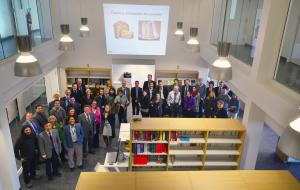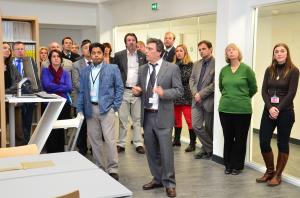A gateway to resources on fusion
Bright, spacious and airy, the new ITER library is a place where you would want to spend time researching ... two hundred square metres dedicated to plasma physics, controlled nuclear fusion and tokamak-related technologies, a full-time staff to assist you in your queries, and a plethora of electronic resources.
With space for 10,000 volumes plus a large archival storage facility, the ITER Document Control Section finally has the means to realize its ambition—that of joining the handful of premiere fusion libraries in the world.
"We're hoping that the ITER library becomes the gateway to technical and scientific information related to fusion," says Daniele Parravicini, section leader of the Document Control Section, during an opening ceremony held on Friday, 11 January. "ITER is the largest fusion project in the world; we'd like to serve the project by offering the best fusion resources in the most modern way."
The library's on-line service offers 24-hour access to a user-driven selection of online journals, over 15,000 e-books, and a catalogue of the resources held at ITER. These are resources that can be accessed from any ITER computer, but having a physical library space (and not just a virtual space) is equally important, according to Daniele. "With all of the electronic resources today, libraries have fewer 'human' resources. But the role of the librarian becomes even more important in this context."
"It's true that having a place to meet and interact is important," agrees ITER Librarian Saroj Das. "Scientific literature is not so easily accessible through a Google search. We're here to help the user find the best resource in the shortest time. If there's something that the project needs, we'll do everything we can to get it." Saroj plans to offer library orientation sessions for small groups of staff in the coming months to train users how to make the most of available resources.
The ITER library has been scaled to meet the project's needs over the 20-year exploitation of the ITER device. As the collection grows, older volumes can be moved to the archives but still remain accessible through the catalogue.
In 2013, the 30 cubic metres of ITER archives that have been stored for the past three years in an off-site facility will be repatriated to the new archival facility in the Headquarters building. When that task is completed, the library will be the unique repository for ITER Project history in-the-making, with conference proceedings dating back to the early engineering design (EDA) days, historical agreements, and papers documenting the last 45 years of fusion research—a "granary" where the collective knowledge on the ITER Project is stored and organized.
Plans are in development to enhance collaboration with other scientific libraries to further enrich the library's resources. Longer term, the Document Control Section team hopes to create an external webpage with access to the library through the ITER website.
"A library is the intellectual resource of an organization," commented Rich Hawryluk, Director of the Department of Administration, during Friday's opening event. "You have a fantastic facility here that is a credit to the ITER Project and to your vision."




